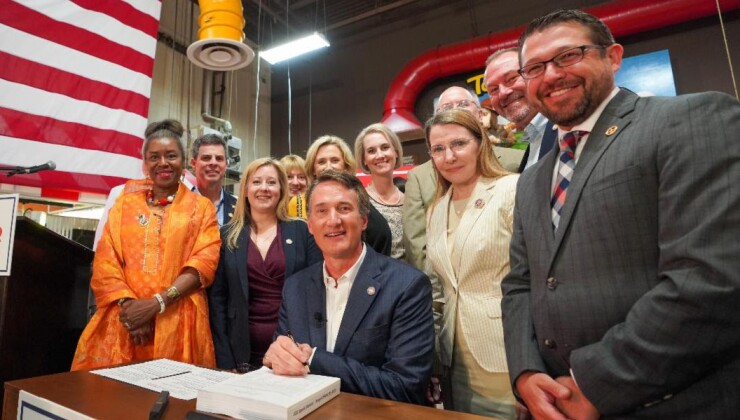Gov. Glenn Youngkin has signed off on a Virginia budget, which contained no tax increases, but did make large additions to the state’s reserves.
The governor ceremonially signed the $165 billion budget for fiscal 2023-2024, which was formally re-enrolled in the Acts of Assembly and adopted on Wednesday. It will go into effect on July 1.

“Working together across party lines, we have made historic investments in our educational system from preschool through grad school, mental health services, economic development programs, and our park systems,” state Sen. Janet Howell, Finance and Appropriations Committee Chair, said in a statement. “We have also made unprecedented additions to our reserves, thus protecting our triple-A bond rating.”
Virginia’s general obligation bonds are rated triple-A by Moody’s Investors Service, S&P Global Ratings and Fitch Ratings.
Youngkin said the budget delivers on his promises to provide tax relief, increase funding for law enforcement and support the development of lab schools.
“Every day we have worked hard to build a more prosperous Virginia, with greater opportunity for future generations,” Youngkin said. “Together, we enacted historic tax cuts and made record investments in education and public safety. Together, we stood for greater accountability and transparency in government."
Included in the budget are $4 billion in tax reductions for families, $100 million in economic development projects and new investments in education, including teacher pay raises.
“I’m very proud of the budget that we have put forward. The end result is not only a structurally balanced budget that protects our triple-A bond rating, but a budget that funds our priorities while simultaneously providing tax relief,” said Delegate Barry Knight, House Appropriations Committee Chair. “No new general fund debt, no tax hikes, no higher fees. It’s a budget we can all be proud of.”
The final budget includes many initiatives, such as $150 million for site development to attract job creators and $10 million to support transformations at state agencies.
It provides almost $4 billion in tax relief to residents, the largest tax relief in the state’s history, and eliminates the 1.5% state grocery tax. It nearly doubles the standard deductions for state income tax filers and gives each taxpayer a rebate of $250 for single and $500 for joint filers. It also exempts $40,000 of the retirement income tax for veterans over 55.
The budget raises education spending to the highest level in state history by providing school districts with $3.2 billion in direct aid and $1.25 billion in grants and loans to support school construction.





